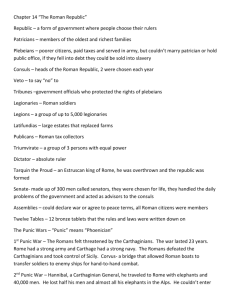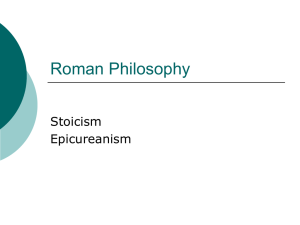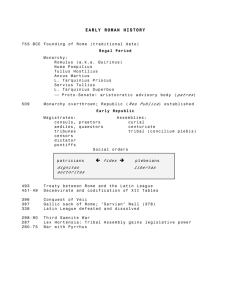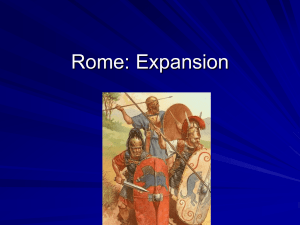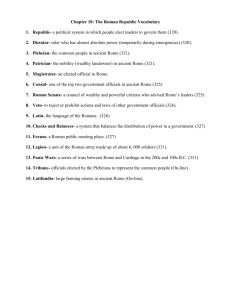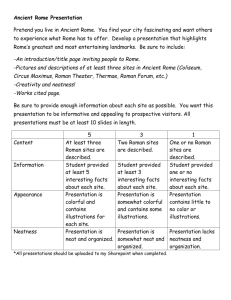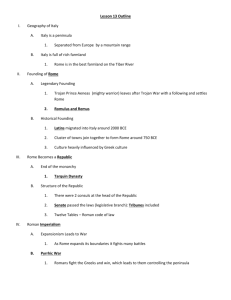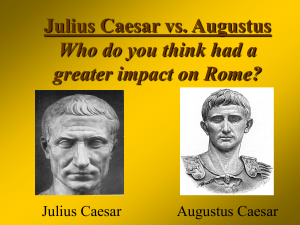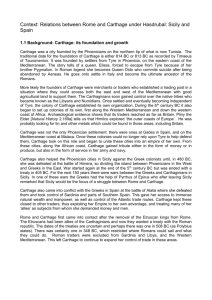Unit 5 - Roman Republic
advertisement
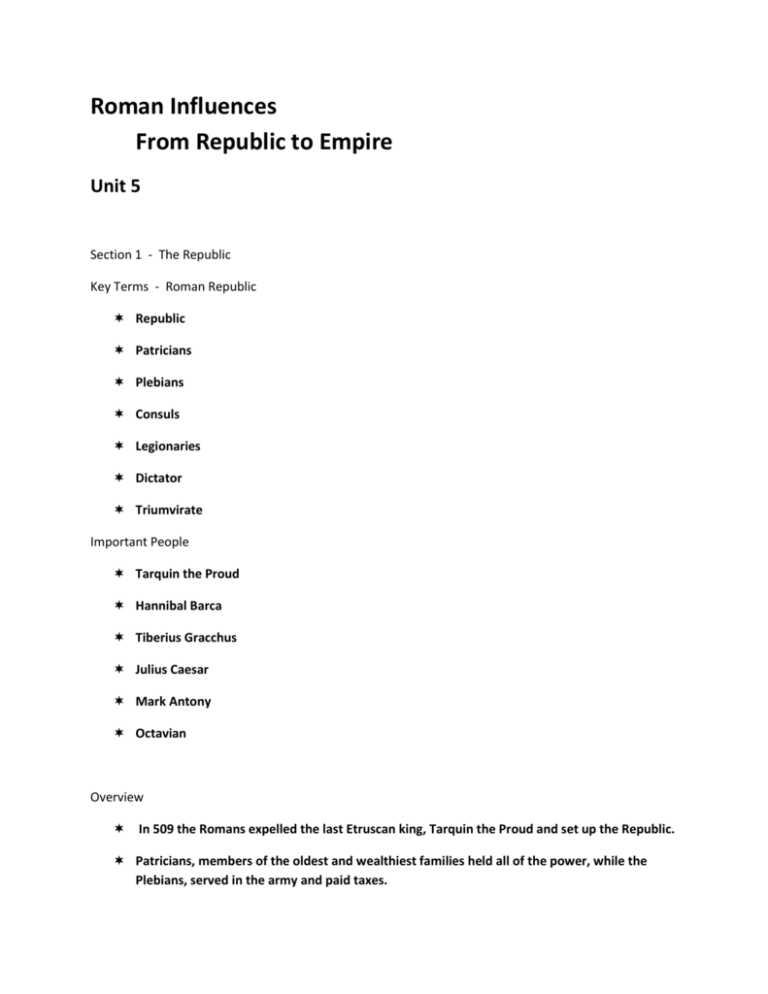
Roman Influences From Republic to Empire Unit 5 Section 1 - The Republic Key Terms - Roman Republic Republic Patricians Plebians Consuls Legionaries Dictator Triumvirate Important People Tarquin the Proud Hannibal Barca Tiberius Gracchus Julius Caesar Mark Antony Octavian Overview In 509 the Romans expelled the last Etruscan king, Tarquin the Proud and set up the Republic. Patricians, members of the oldest and wealthiest families held all of the power, while the Plebians, served in the army and paid taxes. Government - Republic Consul Characteristics *These appointments are only open to Senators who have been Praetor or Consul. *There will always be two Consuls. *The Consuls are responsible for calling and presiding over all meetings of the Senate. Characteristics Continued The Consuls will be responsible for publishing the first Roman newsletter after entering office. No Consul may be removed from office before the end of his/her term. Consul Responsibilities Only the Consuls may call for a division of the Senate (a vote). Only the Consuls may call for elections. Only the Consuls may introduce new Roman laws Senate - Characteristics The dominant force in Roman politics; The senate was not an elected body. consisted of three hundred men, but swelled to over a thousand in the time of Julius Caesar Characteristics Continued Augustus reduced it to six hundred. Senators must have served in some elected office before becoming a member. Responsibilities Rome is NOT a democracy. Only the Senators vote. Judges, Assemblies, & Tribunes All in place to protect the rights of plebians. All Roman citizens were members of the assemblies. Law In 450 BCE Romans wrote the first laws on 12 tablets. Known as the Twelve Tables Most laws were about wills, property rights and court action. Plebian Rights Government becoming more democratic. Plebians were not citizens, but were being protected. By 250 BCE plebians could not be sold into slavery and could hold public office. Section 2 - Expansion Etruscan Land Romans took measures to protect their new republic. Attacked Etruscan lands to create a buffer zone. Expansion By 290 BCE – Leading power in central Italy By 275 BCE – Ruled the entire peninsula By 146 BCE – Ruled the entire Mediterranean world. Military Conquest Rome was able to conquer vast areas due to their well trained army. – Organized into legions – Each legion = 5,000 soldiers called legionaries – Legions were divided into groups of 60 – 120 soldiers. Advantages of Legion Legions over phalanx – Smaller and faster – Each legionary was an independently skilled soldier – Could break from main body of formation and attack from different directions. Section 3 Punic Wars By 246 BCE, Rome had conquered Greek city-states Brought them into contact with the Phoenician colony of Carthage. – Controlled most of North Africa Rome felt threatened by Carthage because of Carthaginian rule of Sicily. – Rome also wanted control of Sicily’s granaries. First Punic War 264 BCE, first war. – Lasted 23 years – Carthage = Navy – Rome = Army Rome built a corvus, movable bridge which turned a naval battle into a land battle. Second Punic War 218 BCE, second war began. Carthaginians led by General Hannibal Barca – Attacked Roman land from the north – Marched from Spain to Italy, crossing the Alps 2nd Continued Used elephants to cross over snow covered mountains. Hannibal’s army won victory after victory Could not capture Rome – Wandered country side reeking havoc. Final Defeat of Carthage Rome attacked Carthage Hannibal was called home to help defend. Carthage was finally defeated in 201 BCE Carthage gives up, pays reparations, cedes Spain. Third Punic War Not really a war, but Roman revenge Carthage attempts to rebuild power Rome again feels threatened. – Launch an attack that will wipe Carthage from the map 3rd Continued Burned the city Plowed salt into the fields Killed all men and sold whatever citizens were left, into slavery. Impact on Other Regions 149 BCE, Corinth and some allies refused to obey Roman law. Roman attacked Corinth and burned it to the ground. – Now all of Greece was added to the empire. Logic Why do you think the whole of Greece collapsed after the burning of Corinth? – EXPLAIN Section 4 Effects of Conquest Agricultural Changes Small farms were replaced by latifundias Hannibal’s invasion changed the scope of farming. – Farmers burned fields to prevent Hannibal and his men from living off the land. – Much of the farmland was ruined. – Most farmers could not afford to fix up the farms. – Only wealthy patricians had the money to repair the land. • They bought the small farms and built them up. Farm to City Farmers were forced to leave their farms and move to the city of Rome itself. – Living conditions were terrible. – Most farmers could not earn a living. • Sold their votes for money • Corruption took hold. Decline Heavy taxation collected by the publicans. – Usually took a stipend for themselves, therefore increasing the taxation on average citizens. By 135 BCE, Rome was in trouble – Farmers lost land – Lost their economic and political independence – Merchants grew poor, because wealthy bought goods elsewhere. Government officials were too busy getting rich care about average people. Gap between rich and poor grew! Rome was no longer politically stable. How did Rome grow in size, but collapse politically? * Give reason and be able to exlain Section 5 Roman Leadership The Reformers Tiberius Gracchus – 1st Reformer – Limit land – Divide public land and give to poor – Senate eventually had him killed due to his radical ideas. Gaius Gracchus – Extended and improved the reforms of his brother. – Rich thought he went too far. – 121 BCE Senate had him killed. The Generals (ALSO REFORMERS) Gaius Marius – Military hero – First person to every elevate from lower class to the office of consul – Set up Rome’s first professional army Marius - Continued Opened army to everyone Helped Rome by providing jobs BUT HURT THE REPUBLIC!!!! – Instead of giving loyalty to the government, soldiers gave loyalty to who hired and paid them. Lucius Sulla Sulla marched into Rome and seized the city. First time a Roman commander lead soldiers against the city. Sulla made himself dictator Julius Caesar First Triumvirate – Lucinius Crassus – Gnaeus Pompeius – Julius Caesar Triumvirate Crassus dies Pompey and Caesar fight over how to rule Caesar had Pompey killed in Alexandria Caesar The Senate now feared him and asked him to return to Rome following several military victories. – He did, however, entered the city in front of his army. – Sign of ultimate power Caesar Had himself crowned dictator – Great Reformer • Redistributed state lands • Founded new colonies over seas • Began public works. Built roads and buildings Put many Romans back to work Planned and paid for gladiatorial games. Doubled the size of Senate Gave citizenship End of Caesar Did a great deal for Rome, but many felt threatened. Feared he would crown himself king. Ides of March, (March 15), the Senate had him killed. End of the Republic Roman people turned against those who killed Caesar Political power passed to another triumvirate – Marc Antony, Octavian, Marcus Lepidus.
